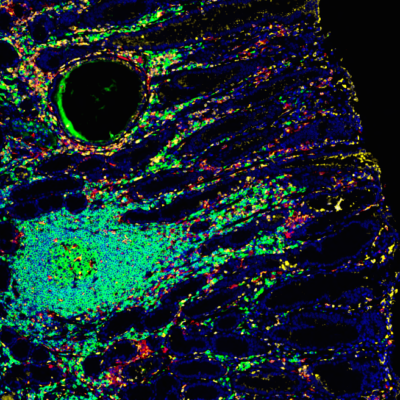Keeping stomach cancer at bay
By Hudson Institute communications
Researchers have identified a protein in immune cells that may play a role in thwarting a type of stomach cancer, paving the way for possible prevention therapies.
A rare but often lethal blood cancer known as MALT lymphoma (a form of B cell lymphoma), develops over time in the stomach of some people infected by the bacterium, Helicobacter pylori (H. pylori).
PhD researcher Michelle Chonwerawong identified a protein in immune cells, NLRC5, which regulates inflammation levels in the stomach after bacterial infection.

In this study, published online in Gastroenterology in March 2020, researchers obtained stomach biopsies from 30 patients from the Monash Medical Centre Gastrointestinal and Liver Unit in Melbourne.
Senior author Professor Richard Ferrero, Research Group Head of Gastrointestinal Infection and Inflammation Research group at Hudson Institute, said NLRC5 was found to play a protective role against precursor lesions in the stomach that can lead to MALT lymphoma.
“NLRC5 represents a new piece in the puzzle of how stomach MALT lymphoma develops in response to chronic Helicobacter pylori infection,” Professor Ferrero said.
“Our research defines a new role for NLRC5 in regulating the proliferation of white blood cells, known as B lymphocytes. These cells form the characteristic tissue lesions that develop into MALT lymphoma.”
Professor Ferrero said levels of NLRC5 expression were significantly higher in stomach tissues from patients with H. pylori infection, compared to patients without.
He said researchers found NLRC5 helped to control stomach inflammation and development of lesions in response to H. pylori infection. However, if NLRC5 did not work properly, this could promote cancer development.
Researchers are now examining the causes of the disease and how to develop new treatments. Investigations in the lab have shown that when NLRC5 is not present in specific immune cell compartments, the disease develops much earlier.
The study involved Hudson Institute, Monash University, Monash Health, and the universities of Newcastle, Melbourne, Florence, Toronto and Hohenheim.
Next steps
Lymphomas are the fifth most common cancer diagnosed in men and women in Australia. Ninety per cent are of B cell origin.
Stomach MALT lymphoma is rare, but it is the most common form affecting non-lymphoid tissues and the most common in the gastrointestinal tract.
NHMRC and US Department of Defense funding has enabled the team to develop a unique preclinical model and demonstrate how drug-based blockage of certain pathways can prevent the B cell condition that precedes stomach MALT lymphoma.
A more recent $50,000 Tour de Cure grant will now help the team continue its work towards new immunotherapies for stomach lymphoma.
Professor Ferrero said based on the preclinical model studies, there are already drugs on the market for other medical conditions that could be repurposed to treat MALT lymphoma cancer.
He said the results could also have implications for other forms of B cell lymphoma, particularly those caused by bacteria and viruses.
“We suggest that it will be possible to not only identify prognostic markers that may be used to screen H. pylori-infected individuals for the likelihood of developing MALT lymphoma, but also develop adjunct therapies that may be used in its treatment,” he said.
About H. pylori and MALT lymphoma
Most cases of MALT lymphoma are caused by H. pylori. Antibiotic treatment can shrink the tumour early on, but the later stages require chemotherapy, which is not always effective.
H. pylori bacteria can live in your stomach and may eventually cause ulcers in its lining or the upper small intestine. These infections can also cause stomach cancer.
Scientists already knew that underactivity in NLRC5 can lead to other types of cancers, but not lymphoma.
Collaborators | Monash Health, Monash University, The University of Newcastle, University of Melbourne
University of Florence, Italy; University of Toronto, Canada; University of Hohenheim, Germany
Funders | NHMRC, US Department of Defence, The Public Health Agency of Canada, Monash University, Victorian Governments Operational Infrastructure Support Program.
Contact us
Hudson Institute communications
t: + 61 3 8572 2761
e: communications@hudson.org.au
About Hudson Institute
Hudson Institute’ s research programs deliver in three areas of medical need – inflammation, cancer, women’s and newborn health. More
Hudson News
Get the inside view on discoveries and patient stories
“Thank you Hudson Institute researchers. Your work brings such hope to all women with ovarian cancer knowing that potentially women in the future won't have to go through what we have!”







